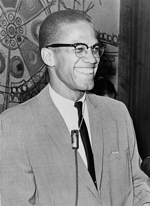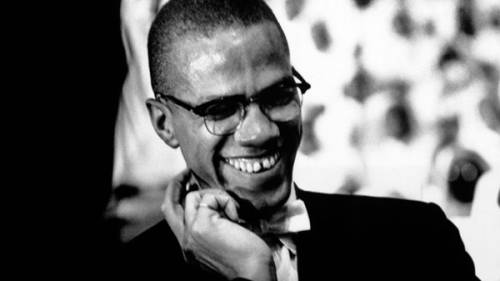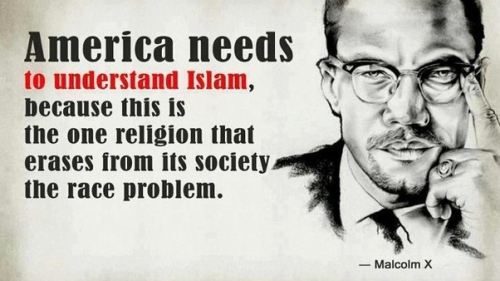Celebrating Malcolm X
Happy Birthday, Malcolm
 |
I am part of the generation - the post civil-rights generation, post-black power generation - that turned Malcolm X into a T-shirt and cap. He was our symbol of racial discontent and political angst. Though we did not live through the brutal repression of Jim Crow, we knew for ourselves, in our own way, the effects of racial inequality. We saw the systematic destruction of urban communities, the incarceration of our peers, the violence and drugs that ravaged our neighborhoods. We knew that even the new opportunities and unprecedented accomplishments that previous generations made possible for us were often marked by racial isolation and insults.
We met Malcolm through the prism of popular culture, and we embraced him as a commodity, to signal our own disbelief in the American dream.
On Malcolm X's birthday, those of us who embraced him as a pop icon need to encounter him again. We need to revisit Malcolm, because he has resisted all of our attempts to craft a single, well-packaged, vision of him. We need to unpack the things about him that remain elusive, difficult, messy and challenging.
We need to pause to think about him, because he left, for us, important social and political lessons.
Though Malcolm's life was short, it was marked by dramatic change. He was born into poverty, madness and racial violence. His youthful arrogance, crime and indulgence led him to jail. But prison was no end for him; through a religious and political awakening, he found freedom in the context of imprisonment. He became an organization man, an orator, a world citizen and a free thinker with a cosmopolitan vision of the world.
Malcolm displayed the capacity to learn, to grow, to discern and to change direction. It takes courage to admit that society's approach to old subjects has grown rigid and needs to evolve and change. It is hard for leaders to admit that they have been wrong in the past. His life is a reminder that greatness is not found in arrogant self-righteousness or intellectual hubris, but in the willingness to be open to our own limitations.
Malcolm also reminds us that the movement is more important than the man. He was fiercely loyal to the Honorable Elijah Muhammad, who was the conduit of his political awakening, the author of his adult manhood, the embodiment of his idea of the sacred, and his dear and beloved friend. But when Malcolm came to believe that his mentor was abusing power in a way that threatened to destroy the very principles that he embraced, he made the difficult choice to walk away from the Nation of Islam.
Many in the post-civil rights generation have yearned for their own history-defining, charismatic leader. But Malcolm's struggle to make his own authentic, political contribution reminds us that ideals are more important than personalities. Progressive political movements that engender lasting change are always bigger than the flawed human beings who lead them. The goal is to invest our energies and efforts in the movement itself rather than in blind loyalty to any single figure. Malcolm reminds us that we must always lead, even as we follow.
Many of our modern leaders live by cynical double standards. They practice slippery personal ethics, while lecturing the masses about morality. They consume conspicuously, while telling ordinary folks to save their pennies. They father children outside of marriage, then blame single mothers for the violence in black communities. They blame individuals for their circumstances, rather than help them deconstruct, understand and overcome the historical, structural, political, reasons for their plight.
Malcolm taught us better. He criticized the powerful rather than the powerless. He pointed to the pathologies of the privileged instead of the failings of the oppressed. His own story of redemption was emblematic of the possibilities available to even the most disempowered, but when he pointed to solutions, they were consistently collective.
Fulfilling his religious responsibility of Hajj, Malcolm discovered that the United States looked very different when viewed from the other side of the Atlantic. Living abroad altered his understanding of race, politics and power. Worshipping in Mecca and living in Accra, he came to understand himself and black America as part of a larger, global struggle for human rights. That sort of world view is crucially important now, in an era in which the United States' domestic and foreign policy has become woefully narrow.
Early in his public career, a young white woman approached Malcolm and asked him what role sincere white allies could have in the struggle for racial equality. He rebuffed her and told her that there was no role for whites at all. Years later, he said he regretted his response and spoke of the difficulty in building workable interracial coalitions. He remained committed to black empowerment and self-governance within African-American organizations, but toward the end of his life he also came to understand the critical importance of anti-racist efforts among white Americans. He taught us that we must acknowledge human interdependence if we hope to build enduring movements out of the fragile and complicated interests that we share.
There are so many more lessons that we might draw from Malcolm's life. He taught us the importance of naming ourselves; the importance of telling our stories honestly so that we create a historical record of our work; the importance of questioning our leaders; and the importance of knowing that the people we think are our allies may ultimately seek to destroy us. In The Autobiography of Malcolm X, Alex Haley recounts a reflection Malcolm X shared with him in the days before his assassination:
"I believe that it would be impossible to find anywhere in America a black man who has lived further down in the mud of human society than I have; or a black man who has been any more ignorant that I have been; or a black man who has suffered more anguish during his life than I have. But it is only after this deepest darkness that the greatest joy can come; it is only after slavery and prison that the sweetest appreciation of freedom can come. I do believe that I have fought the best that I could, with the shortcomings that I have had. I know that my shortcomings are many."
As we stop to reconsider Malcolm X on his birthday, we should reaffirm our own commitments to creating a more just and fair world. We should express to his spirit our gratitude, not for his perfection, but for his courage and for the lessons he imparted to us, to light the way for our struggle.
Melissa Harris -Lacewell is associate professor of politics and African American studies at Princeton University.
Related Suggestions
There is no such thing as a blackman or greenman, there is only humans living in this world. All of them are children of Hadrat Adam and Mother Eve (peace be upon with them)
Thanks for clarifying what you tried to say. I thought long and hard both before/after posting my comments. The more I thought, the more it seemed like an insult to a dear brother of mine. So I had to post a comment. It was just bad choice of words on your part now that you explained it.
I must admit - you are a decent person. I remember you apologized before for posting a comment that you realized was out of line. My sincere thanks to you for that.
Also, we know and acknowledge the deplorable conditions in Muslim societies, which you point out almost in all your comments:) Any critical comments from sincere friends are always welcome. But unrelenting bashing from hate-mongers eventually gets on our nerves. After all, we are humans too even though some bigot might find it hard to believe. And believe me, we deal with it (hate mongering) almost everyday in personal lives, or on news portals.
Thanks again, Merrick! I hope I got your name right:) If not, I apologize!
And we will talk again! We will bicker again:) But as long as we stay respectful to each other, we will be alright.
Take care of yourself!
A brother told me once that this Muslim Ummah became cursed the day it killed Uthman(May Allah be pleased with him). The more I think about it, the more it make sense to me. Allah knows best! Our history is riddled with betrayal and bloodshed since that dreadful day. How could we kill someone like Uthman(rad) after having plenty of time to think about it? He was given the good news of Jannah in his lifetime; he was the son-in-law of the beloved prophet Muhammad(pbuh). We did not stop there, we killed Ali(rad), Hasan and Husein (rad). My brothers and sisters, it is painful! And we haven't changed a bit! And that is why I think the curse is over us. That is why anytime a great leader starts rising from among us, Allah takes him away! Allah knows best!
We lost Umar bin-Abdul-Aziz; we lost Hasan al-Bannah; we lost Malcolm X. All of them were assassinated.
It is time we really need to take a good look at ourselves! How far we have fallen from the standards of Islam! We are divided by greed, racial pride, and nationalist views. All of these go against the core teachings of Islam. This is why we must be careful that we love a brother/sister for the right reason (for Allah's sake), not for the wrong one like racial or national affiliation. That is what our brother Malcolm realized when he went to Hajj and saw the principal of "Equality of all before God" in action.
It is so frustrating sometimes! I pray to Allah that He will give us a great leader to lead us out of this miserable condition. May Allah give us strength to follow His chosen religion in a way that is pleasing to Him. May Allah give us victory over all that is false.
May Allah bless all my brothers and sisters!
And I'm not saying only modern people count, I'm just saying that in this case most they show are from a long time ago but at lest they've made an exception in this case.
There is plenty of things to say about Malcolm X... BUT THERE'S ALREADY HUNDREDS OF LINES OF WRITING ON THAT! Although he also founded the Muslim Mosque, Inc. and the Organization of Afro-American Unity.
I do admit that I only focus on one side of the argument, the positive is usually emphasized already by others in the comments section and I did read that response you made a few weeks ago and do acknowledge that your points are valid.
Only good thing you could think of saying about him was that he was from the 20th century. That goes to show that you and people like you will never say anything good about any Muslim even if he/she does the greatest forms of righteous acts. You merely monitor this site so that you can find faults with it. And often you try to impose yourself on us as our adviser. We don't need your advice, or your patronage.
This is truly unfortunate. And since when the time period a person lived became the determinant of his/her contributions to the world? Can America deny the contributions of the founding fathers just because they lived before the 20th century?
I hope that you can rise above your prejudice one day. And don't claim to me that you are objective and unbiased when it comes to Muslims/Islam. You are not. I have read almost all comments you posted here - none of them has any shred of impartiality.
May Allah guide us all!
Allah knows best!
Take care!
I to am an African-American, and I loved this brother so much. Whenever I first reverted back to Islam, I read a lot of Malcom's books. He was so so intellegent, and it is true that he fought for human rights. The movie of his life was very inspiring as well.
This is a really good article. Thanks islamicity.
Salam Alaikum to all my brothers and sisters,
Sister Fatimah





























